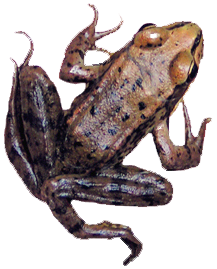January 1 - 3, 2016
Temps dropped into the 20's and very windy for the New Year and second day of the year, so obviously no frogs. Woke up to a steady snowfall on the 3rd, with temps in the mid 20's. Cold for this area, though not unusual. I cherish the snow, as some winters we don’t get any at all, and make a point of going up into the white wonderland forest. Usually everything is wet when the snow starts, the temp dropping, rain crystalizing, so the snow sticks to ever twig, the forest etched white on black. But after the cold, strong wind for two days, the trees are dry and the snow rests upon, rather than fastening, subtle instead of spectacular.
The frog pond (just above the fence) as seen through my neighbor's Bob and Andrew's garden.
Well below freezing when this picture was taken, how do the frogs cope? Down in the pond the surface has frozen but the water beneath is warmer, so the frogs there are probably hanging out. (Frogs commonly hibernate deep under water, their bodies remaining above freezing.) Those up in the forest? Probably relaxing in underground enclaves. If the temperature around them drops below freezing and stays there? Good question. Wood frogs in Alaska (Rana sylvatica), which live as far north as the Arctic circle, spend seven months of the year frozen. Slightly smaller than the red-legged, they hibernate in divots of leaf litter near a pond, lake or stream. At first they freeze at night and thaw during the day but after a week or two of this they stay frozen! (The freezing and thawing may help them convert glycogen stored in their livers to glucose. High concentrations of glucose are pumped into their cells, replacing water, and act as a sort of antifreeze, or cryoprotectant, protecting the cells from freezing and desiccation. The water in the cells is pumped into body cavities, where it freezes.) The frog’s breathing and heart stop until it thaws in spring, when they immediately go looking to mate (of course), the males making loud calls that sound like ducks quacking. It’s not known if red-legged frogs are capable of this deep freeze.

